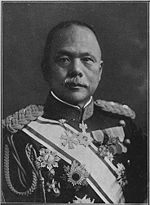
Toseiha
Encyclopedia

was a political faction
Political faction
A political faction is a grouping of individuals, such as a political party, a trade union, or other group with a political purpose. A faction or political party may include fragmented sub-factions, “parties within a party," which may be referred to as power blocs, or voting blocs. The individuals...
in the Imperial Japanese Army
Imperial Japanese Army
-Foundation:During the Meiji Restoration, the military forces loyal to the Emperor were samurai drawn primarily from the loyalist feudal domains of Satsuma and Chōshū...
, active in the 1920s and 1930s.
Led by General Kazushige Ugaki, along with Hajime Sugiyama, Koiso Kuniaki, Yoshijirō Umezu, Tetsuzan Nagata
Tetsuzan Nagata
-External links:...
and Hideki Tōjō
Hideki Tōjō
Hideki Tōjō was a general of the Imperial Japanese Army , the leader of the Taisei Yokusankai, and the 40th Prime Minister of Japan during most of World War II, from 17 October 1941 to 22 July 1944...
, the Tōseiha was a grouping of officers united primarily by their opposition to the Kōdōha faction led by General Araki Sadao. The name "Tōseiha" was actually a pejorative coined by (and only used by) Kōdōha members and sympathizers.
The Tōseiha attempted to represent the more politically conservative (moderate) elements within the army, as opposed to the radical and ultranationalist Kōdōha. The Tōseiha was a non-regional coalition, as opposed to Araki's reintroduction of regional politics into army promotions and policy decisions. Many members were promising graduates of the Imperial Japanese Army Academy and Army Staff College
Army War College (Japan)
The ; Short form: of the Empire of Japan was founded in 1882 in Minato, Tokyo to modernize and Westernize the Imperial Japanese Army. Much of the empire's elite including prime ministers during the period of Japanese militarism were graduates of the college....
, and were concerned about Araki's emphasis of the spiritual élan
Élan
Élan Corporation plc is a major drugs firm based in Athlone, County Roscommon, Ireland which has major interests in the United States. In the late 1990s its value on the Irish Stock Exchange reached over €20bn. It has secondary listings on the London Stock Exchange and the New York Stock Exchange....
of the army over modernization and mechanization. Whereas the Kōdōha was strongly supportive of the hokushin-ron strategy of a preemptive strike
Preemptive strike
A preemptive strike refers to a surprise attack launched with the stated intention of countering an anticipated enemy offensive. Preemptive strike may also refer to:...
against the Soviet Union, the Tōseiha favored a more cautious defense expansion.
Fundamental to both factions, however, was the common belief that national defense must be strengthened through a reform of national politics. Both factions adopted some ideas from totalitarian, fascist and state socialist political philosophies, and espoused a strong skepticism for political party
Political party
A political party is a political organization that typically seeks to influence government policy, usually by nominating their own candidates and trying to seat them in political office. Parties participate in electoral campaigns, educational outreach or protest actions...
politics and representative democracy
Representative democracy
Representative democracy is a form of government founded on the principle of elected individuals representing the people, as opposed to autocracy and direct democracy...
. However, rather than the confrontational approach of the Kōdōha, which wanted to bring about a revolution (the Showa Restoration
Showa Restoration
The Shōwa Restoration was promoted by Japanese author Kita Ikki, with the goal of restoring power to the newly enthroned Japanese Emperor Hirohito and abolishing the liberal Taishō democracy. The aims of the "Showa Restoration" were similar to the Meiji Restoration as the groups who envisioned it...
), the Tōseiha foresaw that a future war would be a total war
Total war
Total war is a war in which a belligerent engages in the complete mobilization of fully available resources and population.In the mid-19th century, "total war" was identified by scholars as a separate class of warfare...
, and would require the cooperation of the bureaucracy and the zaibatsu
Zaibatsu
is a Japanese term referring to industrial and financial business conglomerates in the Empire of Japan, whose influence and size allowed for control over significant parts of the Japanese economy from the Meiji period until the end of World War II.-Terminology:...
to maximize Japan's industrial and military capacity.
After the Manchurian Incident, the two cliques struggled against each other for dominance over the military. After Araki's resignation in 1934 and the failure of the February 26 Incident
February 26 Incident
The was an attempted coup d'état in Japan, from February 26 to 29, 1936 carried out by 1,483 troops of the Imperial Japanese Army. Several leading politicians were killed and the center of Tokyo was briefly occupied by the rebelling troops...
in 1936, with its subsequent purge of the Kōdōha leadership from the military, the Tōseiha lost most of its raison-d'etre. Under Hideki Tōjō and Muto Akira, the two factions merged into the Imperial Way Faction
Imperial Way Faction
The was a political faction in the Imperial Japanese Army, active in the 1920s and 1930s and largely supported by junior officers aiming to establish a military government, that promoted totalitarian, militarist, and expansionist ideals...
nationalist party.

